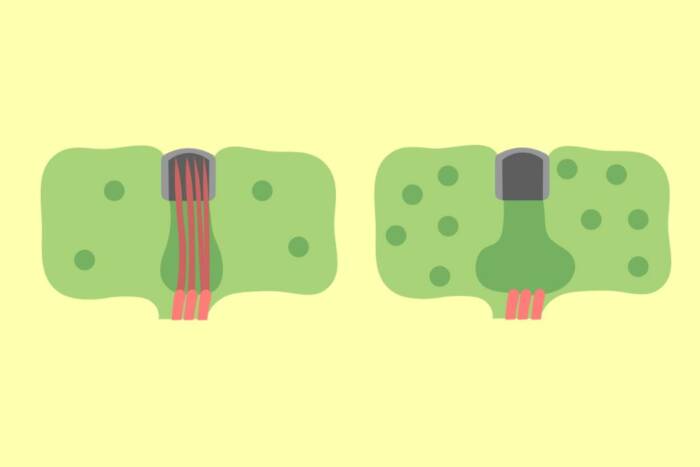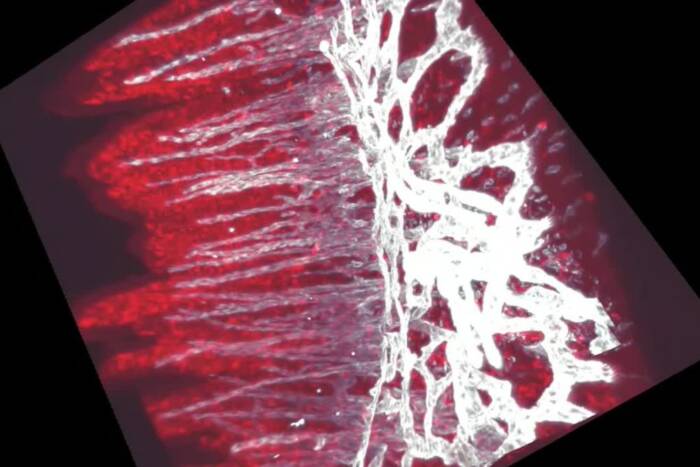David Rockefeller Fellowship awarded to two neuroscientist third-years
by LESLIE CHURCH
Given annually, the David Rockefeller Fellowship is intended for an outstanding third-year student who demonstrates exceptional promise as a scientist and a leader. This year, for the first time, the award has been given to two recipients, a decision that is a testament to the high caliber of the university’s student body, from which two equally strong candidates emerged: Raphael Cohn, of Vanessa Ruta’s Laboratory of Neurophysiology and Behavior, and Alexander Nectow, of Jeffrey Friedman’s Laboratory of Molecular Genetics.
The David Rockefeller Fellowship was established by alumni in 1995 as an expression of gratitude for Mr. Rockefeller’s role in founding the university’s graduate program and for his commitment to its success. Mr. Rockefeller has said that few honors have meant so much to him as the creation of this fellowship.
Mr. Cohn, who grew up in Canarsie, Brooklyn, had always had an interest in biology and the brain, but was skeptical of the possibility of achieving a complete understanding of such a complex system. It was a first-year graduate student seminar given by Dr. Ruta, a Rockefeller alumna herself who was awarded the fellowship in 2003, that changed his mind.
“I was amazed at her ability to use electrophysiology and imaging techniques to trace complete circuits in the fly brain,” says Mr. Cohn. “It was the first time I really felt like we could actually begin to understand how the brain, as a whole, functions.”
Mr. Cohn’s thesis is centered on the mushroom body, a part of the olfactory processing pathway in the insect brain. The structure allows the fly to learn from experience — to connect a certain odor with a contextual clue such as an electric shock or a sugar reward. Mr. Cohn is using electrophysiology, functional imaging and other genetic tools to understand how neuromodulators like dopamine interact with synapses in the mushroom body to assign meaning to specific odors.

Fellowship. Raphael Cohn (left) and Alexander Nectow receive fellowship citations from Rockefeller alumnus Richard Bockman, professor of medicine at Weill Cornell Medical College.
Mr. Cohn received his bachelor’s degrees in computer science and engineering as well as cognitive science from the University of Pennsylvania, and earned a master of science in mathematics and the foundations of computer science from Oxford University. His passion for art, which led him to study as a Fulbright Scholar at the Bezalel Academy of Art and Design and the Technion Institute of Technology in Israel, also motivated him to organize weekly art classes at Rockefeller.
Alexander Nectow also had a strong interest in neuroscience, and had intended to become an academic neurosurgeon before deciding that research — particularly the intersection of science and engineering — was his calling.
“Early on, I decided to split my time between questions that really fascinated me and technology developments to complement them,” he says.
Mr. Nectow graduated with a bachelor’s degree in engineering science and a master’s in biomedical engineering from Tufts University. When he first visited Rockefeller as a prospective student, he found a place where everyone else was as excited about research as he was.
“I was blown away by the quality of the people here and the level of independence that I would be given,” Mr. Nectow says. “There is so much incredible science going on in such a high concentration.”
After joining Dr. Friedman’s Laboratory of Molecular Genetics, Mr. Nectow was initially interested in the neural circuitry underlying susceptibility to neuropsychiatric disorders such as depression, but he soon realized that research was lacking on even the basic functions of those circuits. A new technology he has developed, called Retro-TRAP, has allowed him to profile neurons based on their patterns of projection — work that was published in Cell in June. He used the technique to identify molecular markers for the ventral tegmental area, a heavily dopaminergic structure in the midbrain.
Mr. Nectow also launched a journal club in the Friedman lab to discuss current topics and tools in neuroscience.


